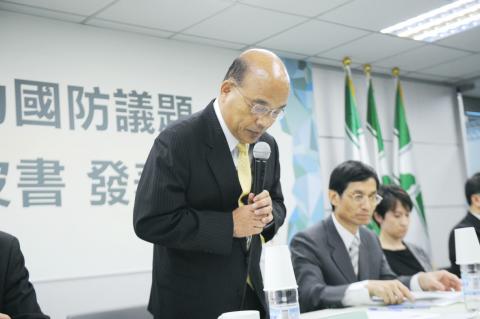|
Su apologizes over
Accounting Act row
MAKING AMENDS: A DPP lawmaker has initiated a
signature campaign for a legislative reconsideration as the Executive Yuan is
adamant that it would not veto the amendment
By Chris Wang and Shih Hsiu-chuan / Staff reporters

Democratic Progressive Party
Chairman Su Tseng-chang bows as he apologizes to the public on behalf of the
party in Taipei yesterday for the controversy over an amendment to the
Accounting Act.
Photo: CNA
Democratic Progressive Party (DPP)
Chairman Su Tseng-chang (蘇貞昌) yesterday apologized to the public for the party’s
involvement in the controversial amendment to the Accounting Act (會計法), while
DPP headquarters and its legislative caucus launched separate efforts to correct
the legislation foul-up.
The amendment, passed at the last minute in closed-door cross-party negotiations
on Friday last week before the legislature went into recess, was supposed to
exempt research grants given by the government to professors and elected
officials’ special allowances from being audited.
However, the word “teaching [faculty]” was missing from the amended act’s
Article 99-1, which means professors may still face prosecution.
Meanwhile, convicted officials, such as former Non-Partisan Solidarity Union
legislator Yen Ching-piao (顏清標), who has been in jail since Feb. 19 after he was
sentenced to three-and-a-half years in prison for using nearly NT$20 million
(US$668,500) in taxpayer money to visit hostess bars, will be released once the
amendment is promulgated.
“The DPP has to take responsibility for its role in the legislation, which the
general society has found difficult to accept. As [party] chairman, I would like
to apologize to the people on behalf of the party,” Su said.
In an effort to correct the mistake, which would require either a veto from the
Executive Yuan or a reconsideration by the Legislative Yuan before the president
signs it into law, Su met Premier Jiang Yi-huah (江宜樺) at the Executive Yuan
yesterday afternoon and asked Jiang to veto the amendment in accordance with the
Constitution. Jiang turned down his request.
According to Executive Yuan spokesperson Cheng Li-wun (鄭麗文), Jiang reiterated
the Cabinet’s stance that it has no plan to veto the bill.
The regulatory agency of the Accounting Act, the Directorate-General of Budget,
Accounting and Statistics, has made its view on the amendment very clear, that
decriminalization could be applied to the use of research budgets by professors,
Cheng quoted Jiang as saying.
Meanwhile, DPP lawmakers decided to take the matter into their own hands by
proposing a reconsideration.
DPP Legislator Yeh Yi-jin (葉宜津) said at the legislature that she had launched a
petition for a reconsideration and should be able to collect the required
minimum of 20 signatures to have the proposal discussed in the extra legislative
session which is set to begin on Thursday next week.
“If the Executive Yuan refuses to shoulder the responsibility, then the
Legislative Yuan should hold itself accountable for the mistake. No matter how
the amendment turns out, it shouldn’t be what it looks like now,” she said.
Yeh also called on the Presidential Office to hold off signing the amendment to
give the Legislative Yuan ample time to discuss the controversial amendment.
DPP caucus convener Ker Chien-ming (柯建銘), one of the participants in the
closed-door meeting that approved the amendment, has come under fire from some
pan-green supporters and DPP lawmakers, who said they were never informed about
a “secret deal” to free Yen in exchange for stopping the prosecution of
professors accused of misusing public grants.
Several DPP local officials urged party headquarters to remove Ker’s position as
a legislator-at-large seat, while others called for him to step down as caucus
convener.
Former DPP chairperson Tsai Ing-wen (蔡英文) also urged the DPP to assume
responsibility for its mistakes so supporters would keep their faith in the
party.
Tsai said the error was more than a “documental mistake” and must be corrected
immediately because “there was no point in promulgating the law when everyone
knows it is wrong.”
Tsai urged President Ma Ying-jeou (馬英九) to order the Executive Yuan to submit a
veto within 10 days according to Article 3 of the Additional Articles of the
Constitution.
Separately, in a pre-recorded interview with Broadcasting Corporation of China
which was aired yesterday morning, Jiang reiterated his position that the
Executive Yuan would not veto the bill.
A typographical error led to the omission of the word “teaching [faculty],” but
this will not affect the application of the amendment to professors, because in
the preamble, it is clearly stated that the Accounting Act was revised to
include ‘professors’ in the decriminalization package,” Jiang said.
He added that it was not the Executive Yuan’s intent to exclude “professors”
from the amendment.
Jiang said the legislature had consulted with the Executive Yuan about the
amendment before it went to second and third reading, but apparently, the
legislature did not accept the Executive Yuan’s suggestion that exceptions to
the decriminalization shall be made to expenditure of public funds for private
purposes.
|
![]()
![]()
![]()